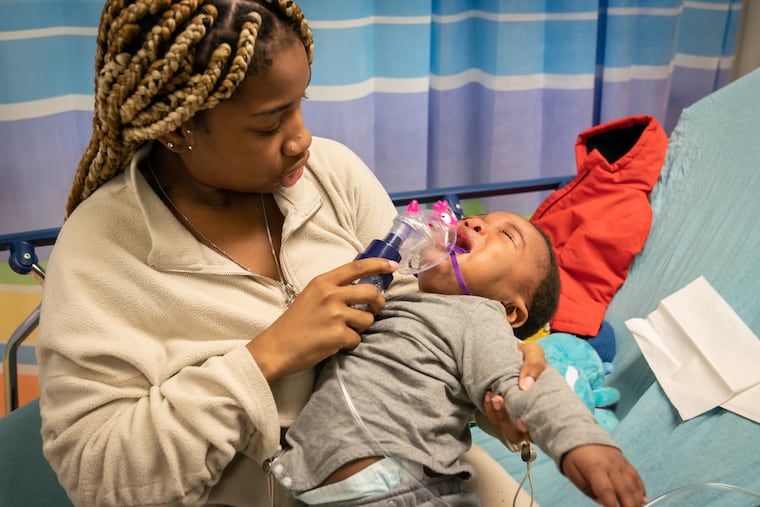How to protect your kid with asthma as respiratory viruses surge
Philly kids have asthma rates twice as high as in the U.S. In virus season, they suffer twin scourges.

About 21 percent of Philadelphia children suffer from asthma, more than double the national rate. That’s more than 1 out of 5 kids citywide, according to Penn Medicine researchers, with the highest rates of childhood asthma in North, Northeast, and West Philadelphia neighborhoods.
Many families may not appreciate how much virus season can compound their suffering. More than 90 percent of asthma attacks in children are caused by respiratory viruses, such as influenza, rhinovirus, adenovirus, and RSV, or respiratory syncytial virus, according to pediatrician James Reingold, who heads the emergency department at St. Christopher’s Hospital for Children in North Philadelphia.
Another, better-known trigger for asthma is air pollution and indoor allergens, such as dust mites, pets, and mold.
» READ MORE: Inside the ‘tridemic’: North Philly children struggling to breathe are waiting hours to be seen at the ER
“Right now, RSV and flu are triggering tons of asthma,” Reingold said. “The major risk with these viruses sweeping through the community is that it will bring into the hospital all the children suffering with asthma.”
Here’s some guidance for parents and guardians from the American Academy of Pediatrics on how to help protect children with asthma during virus season.
What should I do if my child has asthma and respiratory viruses are surging?
Come up with an asthma action plan that you can provide to your child’s school or daycare provider. Talk to your pediatrician about how to prevent asthma emergencies by preventing and controlling flare-ups. Make sure your plan includes a list of the medications taken, early warning signs for asthma symptoms, and instructions on when to use the medicines.
How can I help prevent my child from having an asthma attack during viral season?
Get vaccinated. While there is no vaccine available for RSV, children ages 6 months and up should get vaccinated against COVID-19 and the flu.
Make sure you have sufficient supplies of asthma medication at all times, and call for refills when the inhaler is getting close to empty. It’s also important to make sure your children wash their hands frequently, eat nutritious food, get good sleep, physical activity, and manage their stress.
When should I seek emergency care for my child with asthma?
Go to the emergency department immediately or call 911 if your child:
Can’t catch their breath or speak in full sentences.
Begins belly breathing, or rapid movement of the muscles between the ribs, abdomen, or neck.
Complains of chest pain or chest tightness while struggling to breathe, especially older children.
Doesn’t respond to albuterol treatments.
Feels drowsy or confused. Or turns bluish or grayish around their mouth, face, or chest.
» READ MORE: ER, urgent care or doctor’s office? How to decide where to take your sick kid
Staff writer Abraham Gutman contributed to this article.